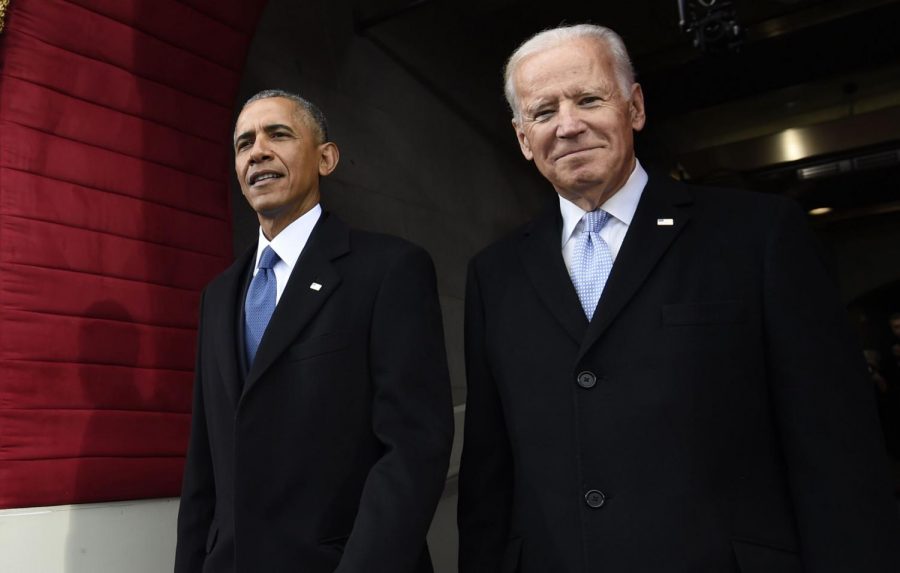What does COVID-19 mean for the 2020 election? Political Union discusses
Former U.S. President Barack Obama and former Vice President Joe Biden arrive for the Presidential Inauguration of Donald Trump on January 20, 2017. Political Union discussed the impact of coronavirus on Biden, the presumptive Democratic nominee, and his chances to beat Trump, the incumbent president, in the general election.
April 14, 2020
Though the coronavirus pandemic complicates the ability to compare the 2020 presidential election to previous ones, other indicators like economic growth will be obstacles for President Donald Trump’s re-election, political science Prof. Daniel Galvin said at a virtual event Tuesday.
“You can explain a lot about election outcomes with an economic variable and a presidential approval variable,” Galvin said. “The fundamentals are pushing against Trump’s reelection.”
Northwestern Political Union hosted a virtual “Civics and Snacks” event on Tuesday, where Galvin, whose research focuses on the American presidency and political parties, discussed the impact of the coronavirus pandemic on the upcoming 2020 election.
The discussion was held the same day former President Barack Obama endorsed former Vice President Joe Biden for president, and one day after Sen. Bernie Sanders (I-Vt.) endorsed Biden. With key politicians united behind a single candidate, the focus of the event centered on the November general election.
Galvin discussed the issue of polarization, questioning whether such fundamentals mattered in an extremely divided political sphere. Polarization, he said, has increased markedly in the past decade.
It also creates fewer swing voters, he said. In this climate, campaigns focus less on convincing voters that they are the best candidate and more on mobilizing the voters within their parties.
“Given polarization, it makes sense that Trump’s political strategy is base mobilization,” Galvin said. “With fewer swing voters, turnout is key.”
Galvin’s final point related to the presidency in times of crisis. Crises, including wars, recessions, terrorist attacks and pandemics, create unique political moments. Galvin said that during these times, the weaknesses of the governing party are exposed, and the minority party has the opportunity to repudiate the opposition’s principles. It can be a “politically formative” time, the professor added.
Students then added their thoughts about and predictions for the 2020 election to the conversation, discussing the possibility of mail-in voting, Biden’s potential running mate choices and the lasting effects of the 2016 election on politics.
Weinberg freshman Sophie Gilbert said she’s concerned about Biden’s choice to center his campaign around his electability.
“A lot of the support for Biden is based around getting Trump out of office,” Gilbert said. “So it’s hard to know what’s actually going to happen if that goal is accomplished.”
Some students agreed Biden’s support often did not come from voters’ enthusiasm for him as a candidate, especially in the early days of the primary, when there was such a wide range of candidates.
Students, including Weinberg freshman Sonia Peters, were also interested in how Bernie Sanders and his supporters would impact the election and potentially, a Biden White House, as well as the trajectory of the Democratic Party.
“The most interesting part of this election cycle is what it means for the Democratic Party,” Peters said. “I’m interested to see if Biden will be able to bridge the divide between moderates and progressives.”
Email: emilysakai2023@u.northwestern.edu
Twitter: @em_sakai



